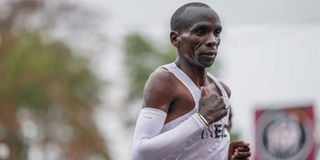Eliud Kipchoge says no human is limited. Folks, that’s not true

Eliud Kipchoge during the INEOS 1:59 Challenge at Prater Park in Vienna, Austria on October 12, 2019.
What you need to know:
- There’s no way a man who weighs 300 kilogrammes is going to run a marathon in under two hours, whether against himself or in a real competition.
- I want to emphasize the centrality in our lives of wishing thoughtfully, but not thinking wishfully.
Last month, Kenyans and the world watched in disbelief as 34-year-old world-class marathoner Eliud Kipchoge ran 42 kilometres in 1 hour 59 minutes and 40.2 seconds.
It was the first time known to history records that a human had run the marathon in under two hours. Perhaps an unknown person in the Amazon has run faster. If so, history was ignorant of any such feat until Mr Kipchoge’s conquest of time.
After Mr Kipchoge soared into the heavens — dwarfing all other humans — there was understandable delirium. But what concerned me was the irrational exuberance of the moment. Mr Kipchoge himself, now a god among mere mortals, loudly proclaimed that “no human is limited.” That’s an absurd lie.
NO HUMAN IS LIMITED
It didn’t take long for every Kenyan — and many around the globe — to thoughtlessly chant Mr Kipchoge’s catchy feel-good phrase. On the lips of every obviously limited human were the words “no human is limited.”
No, people, we are all limited — severely. Let’s cut out the foolishness. If you doubt me, find a full-length mirror, strip down to your state of nature, and take a closer look. Your natural limitations will stare right back at you.
Better yet, pick up a book on nuclear physics, advanced calculus, or complex legal theory and you will quickly develop a migraine. Or go try to stop LeBron James of the LA Lakers from driving to the basket. You will suffer painful embarrassment.
I am not saying what Mr Kipchoge accomplished isn’t extraordinary. Or otherworldly. It was phenomenal. But let’s put it in context so we don’t get carried away. Let me tell you what he didn’t do. Mr Olympus, if I may so call Mr Kipchoge, didn’t run the first sub-two-hour marathon under real competition conditions.
He ran against himself without having to be worried — or psyched out — by real competitors. Instead, he was escorted by friendly “sycophants” brought there to help him break the two-hour barrier. It’s like a boxer who knocks out a hapless sparring partner. Or a dictator running against himself.
RECORD IS FAKE
So, in a sense Mr Kipchoge’s “record” is fake. The first true under-two-hour marathon hasn’t been run yet. That will only, and only, happen when world-class marathoners will duel each other in a real marathon under competition conditions in one of the known or signature marathons in New York, Chicago, Berlin, London, Boston, or at the Olympics. I eagerly await that day.
I wish and hope that Mr Kipchoge will break the two-hour time record in one of those venues. In the meantime, let’s accept that we are all limited. I know folks will throw electronic stones and hurl drunken epithets at me. That’s why one of us would be unnecessary if we held identical thoughts.
Let’s talk about human limitations. Human abilities and disabilities are natural. We all have them. Both have a zenith and a floor. The zenith is the inflection point where the pinnacle of our endurance and achievement are stretched. The floor is where the gravity of our disability denies us success.
For example, there’s no way a man who weighs 300 kilogrammes is going to run a marathon in under two hours, whether against himself or in a real competition.
You can take that to the bank until the end of time. Such a human is limited — weighed down — by his body mass. It would be cruel and callous to tell him a white lie. Or mischievously mislead him.
I know the power of hope, but we should hope thoughtfully, not thoughtlessly. For, without hope, that which looks impossible can’t be attained. We need to try, because unless we try we can’t do whatever it is we hope to do. That’s why I thank my earliest teachers in primary school because they convinced me that I could do anything I put my mind to.
THINKING WISHFULLY
Of course that wasn’t true literally. But it was true to some extent, even though the rest of it was well-meant motivational gobbledygook. But kids, especially, need such sweet nothings said often by adults.
However, adults shouldn’t be too licentious with useless happy talk. Too much sugar isn’t good.
I want to emphasize the centrality in our lives of wishing thoughtfully, but not thinking wishfully. For instance, you are better advised not to underestimate your opponent. Treat every opponent, or challenge, as though it, or he, were formidable. That way, you will not let your guard down and lose to an unworthy challenger.
Don’t overestimate your abilities. Don’t tell yourself that you aren’t limited. Assume, in fact, that you are limited so you don’t do a Don Quixote.
My advice to all and sundry is not to drink the Kool-Aid — we humans are limited, no matter what the great Mr Kipchoge says. It’s human to be limited.
Makau Mutua is SUNY Distinguished Professor at SUNY Buffalo Law School and Chair of KHRC. @makaumutua.





